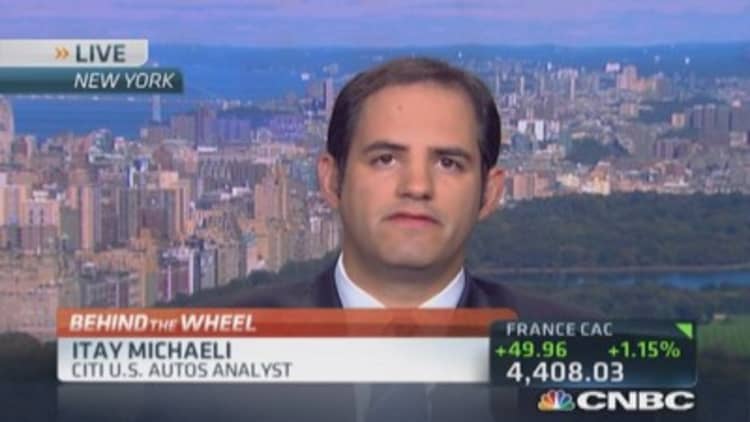
A new study raises questions about the dangers facing drivers using hands-free, voice-activated systems to make phone calls or work their car's entertainment systems.
All of the systems increase the amount of distraction a driver has to deal with, essentially increasing their chances of having an accident, according to AAA.
"Hands-Free is not risk-free," said Peter Kissinger, president and CEO of the AAA Foundation for Traffic Safety. "There's a misunderstanding many people have that they are not increasing their chances of an accident just because they are using voice-activated systems when driving."
Read MoreSelf-driving cars—the next terrorism threat?
In fact, when AAA studied the reaction times of 167 drivers using voice-activated systems to make phone calls or change the radio station, it found drivers had slower reaction times and increased levels of distraction.
"The level of distraction depends on how complex the system is within a particular vehicle," Kissinger said. "When drivers have to give numerous commands and their mental workload goes up, their level of distraction goes up."
In short, the AAA study confirms what many safety advocates have said for some time. The problem of distracted driving won't be eliminated completely by people using voice-activated systems.
Distracted driving fatalities
Last year 3,328 people in the U.S. were killed in distracted driving accidents according to the National Highway Traffic Safety Administration. Another 421,000 were injured.
Those statistics, along with the growing demand by Americans to stay connected at virtually all times, have led automakers to develop and push Bluetooth and voice-activated systems that allow drivers to stay connected and control their vehicle's entertainment options all while keeping their hands on the wheel.
At least 86 percent of all new vehicles in the U.S. offer Bluetooth as a standard feature, according to Automotive Lease Guide. Furthermore, it's an option on all but 3.4 percent of all new vehicles.
Read MoreCar buyers say connectivity makes or breaks a deal
The issue with many of the systems is that they are not as intuitive as they should be, AAA says.
"The systems don't always understand what you are asking them to do. With some systems, if you weren't perfect with your request, the system didn't get it," Kissinger said.
Toyota system is tops, GM lags
As part of the study, AAA looked at the level of distraction drivers encountered in six different systems. Distraction was calculated by measuring reaction times, subjective assessments and heart rates.

On average, drivers had seven years of driving experience and were between 26 and 29 years old. They spent 90 minutes in vehicles, being measured during 10-minute increments.
So which systems caused the least amount of distraction?
Toyota's Entune system, according to AAA.
"It is simple, intuitive and reasonably error free so there was less time spent on task," Kissinger said.
After Toyota, the systems registered more distractions in this order: Hyundai, Chrysler, Ford, Mercedes-Benz and Chevy.
Read MoreGM's big bets: Connectivity, China and Cadillac
GM said the AAA study is not indicative of the improvements the automaker has made with its MyLink infotainment system.
"The systems tested by AAA were in 2013 models and since then we have improved our voice recognition software," said GM's Annalisa Bluhm. "We believe drivers keeping their eyes on the road and hands on the wheel is critical to limiting distractions and that's what our system is all about."
Kissinger admits automakers are in a tough spot.
Consumers want to stay connected, while lawmakers have come to a consensus that Bluetooth connections for phone calls is the best approach to limiting distracted driving.
"I am sympathetic to an industry that's trying to meet people's needs," he said. "But these systems being too complex is a concern."
Questions? Comments? BehindTheWheel@cnbc.com.


